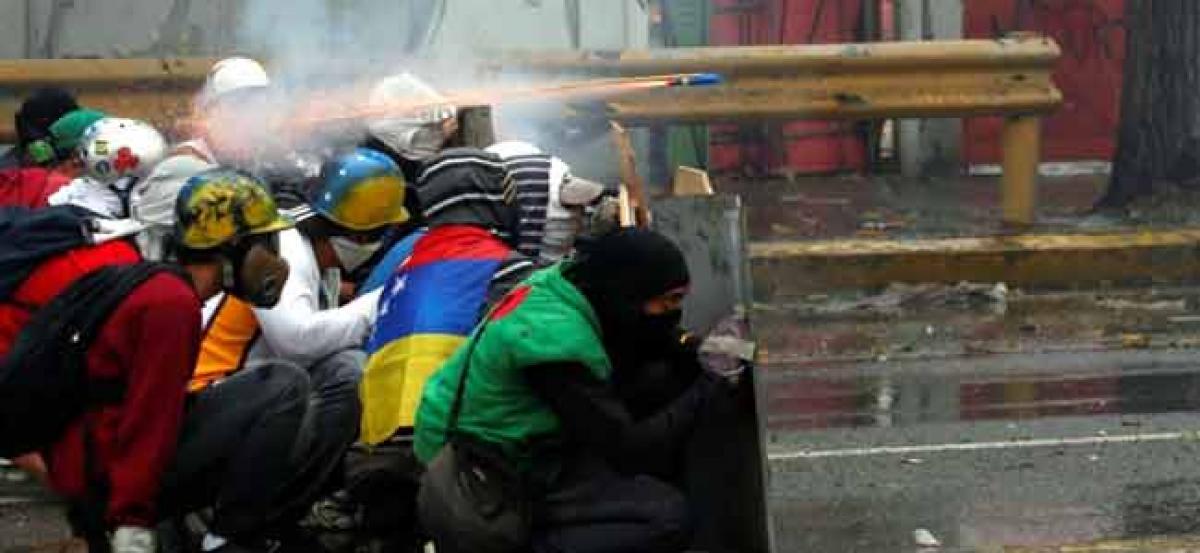Live
- Equipping the next generation
- Today is World Kindness Day: A celebration of compassion and unity
- AI-driven dataset to reveal new insights around diabetes
- Researchers develop new portable knee rehab device to revolutionise post-surgical therapy
- Why Australia's Binar CubeSats Burned Out Early: Solar Activity's Devastating Impact on Satellites
- Tyagaraja’s Legacy Celebrated in Ballet
- Priyanka Chopra shares what she loves to do after a long day at work
- Shraddha Kapoor reveals an interesting detail about people with big foreheads
- South Africa expects G20 summit to strengthen multilateralism
- AAP govt deprived residents of better health infra: Vijender
Just In

Rock-throwing Venezuelans braved tear gas and rainstorms on Friday, blocking streets in protest against a legislative super-body to be elected on Sunday that critics call an attempt by President Nicolas Maduro to create a dictatorship.
CARACAS: Rock-throwing Venezuelans braved tear gas and rainstorms on Friday, blocking streets in protest against a legislative super-body to be elected on Sunday that critics call an attempt by President Nicolas Maduro to create a dictatorship.
The election of a constituent assembly has been broadly condemned by countries around the world as a weakening of democracy in a country whose economy has been crippled by recession despite its vast oil resources.
Opposition demonstrators said urgency was increasing as they set up barricades along main roads in the capital, Caracas, pelted by sheets of rain and teargas canisters fired by police.
"If this election happens on Sunday, we lose everything. We lose Venezuela," said a 23-year-old-woman who identified herself as a student, face covered against the gas, declining to give her name.
Confrontations with security forces, which have left more than 110 dead over the last four months, were modest on Friday as protesters and police were doused by tropical downpours.
The government banned protests from Friday to Tuesday but opposition figure Henrique Capriles called on followers to block streets again on Saturday and to hold protests along the country's main roads on Sunday.
Venezuelans have been protesting against Maduro to demand he respect the opposition-led Congress and resolve chronic food and medicine shortages that have fueled malnutrition and health problems.
(For graphics on Venezuela's economic crisis and anti-government protests see: tmsnrt.rs/2pPJdRb and tmsnrt.rs/2ujuylf)
Amid a steep recession and triple-digit inflation, the bolivar currency weakened past 10,000 bolivars per U.S. dollar on the black market on Friday, having fallen more than 99 percent since Maduro came to power in April 2013.
Maduro says the 545-member assembly, which will have the power to dissolve state institutions and rewrite the constitution, will bring peace to the convulsed country.
The opposition dismisses such promises.
"If the constituent assembly is activated there will be no way out. It will be a legalized dictatorship," an 18-year-old chef, who said high inflation has rendered his monthly paycheck virtually worthless, told Reuters, also declining to give his name.
"This protest has been urgent from the beginning, but these two days before the election will be decisive."
Venezuela's Supreme Court said on Friday it ordered the arrest of Alfredo Ramos, mayor of Iribarren, part of the city of Barquisimeto in the state if Lara. He is accused of facilitating anti-Maduro protests.
And U.S. Vice President Mike Pence spoke with opposition activist Leopoldo Lopez, who is under house arrest in Venezuela. Pence reiterated the White House's pledge to impose "strong and swift economic actions" if Sunday's vote goes ahead, the vice president's office said in a statement.
The United States this week sanctioned a group of ruling Socialist Party officials, and the U.S. Embassy ordered family members of staff to leave the country.
That may have been more of an effort to pressure Maduro than to respond to the country's security situation, which has been challenging for years, said one former senior CIA official.
"It's a powerful political signal, more than a means of protecting staff," the former official said, speaking on condition of anonymity.
Adding to Venezuela's growing international isolation, Colombian airline Avianca stopped operations in the country on Thursday due to "operational and security limitations."

© 2024 Hyderabad Media House Limited/The Hans India. All rights reserved. Powered by hocalwire.com







